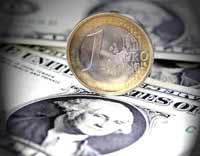Euro continues its way up against dollar
The euro continues to gain value against the US dollar. The European currency set another record Thursday, March 06, 2008 as it reached the level of $1.5347. However, the euro dropped slightly before the meeting of the European Central Bank.

The euro set its new all-time record against the declining American currency in European morning trading and then fell back to $ 1.5322. It became yet another record for the euro that is used in 15 countries.
The record was set shortly before the meeting of the European Central Bank in Frankfurt, Germany. Specialists expect the bank to keep its benchmark interest unchanged at four percent. It is worthy of note that the US Federal Reserve Bank has made a number of decisions lately to cut its interest rate to three percent.
"Inflationary pressures similarly remain something of a high-profile concern of the Bank of England, but speculation continues to point toward a quarter point cut during the second quarter," said James Hughes of CMC Markets.
Another European currency, the British pound sterling, edged higher to $1.9951 Thursday from $1.9916 the previous night.
The dollar drifted lower to 103.41 Japanese yen from 103.87 yen on Wednesday.
The latest record drew a new round of criticism in the euro zone, particularly from trade unions worried its excessive strength will hamper exports to the U.S.
"The euro's continuing appreciation is becoming alarming," the European Trade Union Confederation warned. "An excessively expensive euro will cost European jobs, coming as it does on top of other setbacks to growth - the subprime financial crisis and credit squeeze, the U.S. recession, and the end of the construction boom in several EU countries."
European Union businesses said they were starting to feel the pinch, too, notably from U.S.-based buyers who assert that the high euro makes their goods more expensive.
"We said when the euro was above $1.40 that we feel the pain. When the euro is above $1.50, it is alarming," said Ernest-Antoine Seilliere, president of the EU employers' group BusinessEurope.
The euro has been bolstered by a string of downbeat U.S. economic reports, too, that has driven the dollar lower and lower as fears of a U.S. recession mount.
Speculation has mounted that the Fed might cut rates by as much as three-fourths of a percentage point this month. Lower interest rates can jump-start a nation's economy. But they can also weaken its currency as traders transfer funds to countries where they can earn higher returns.
Subscribe to Pravda.Ru Telegram channel, Facebook, RSS!

